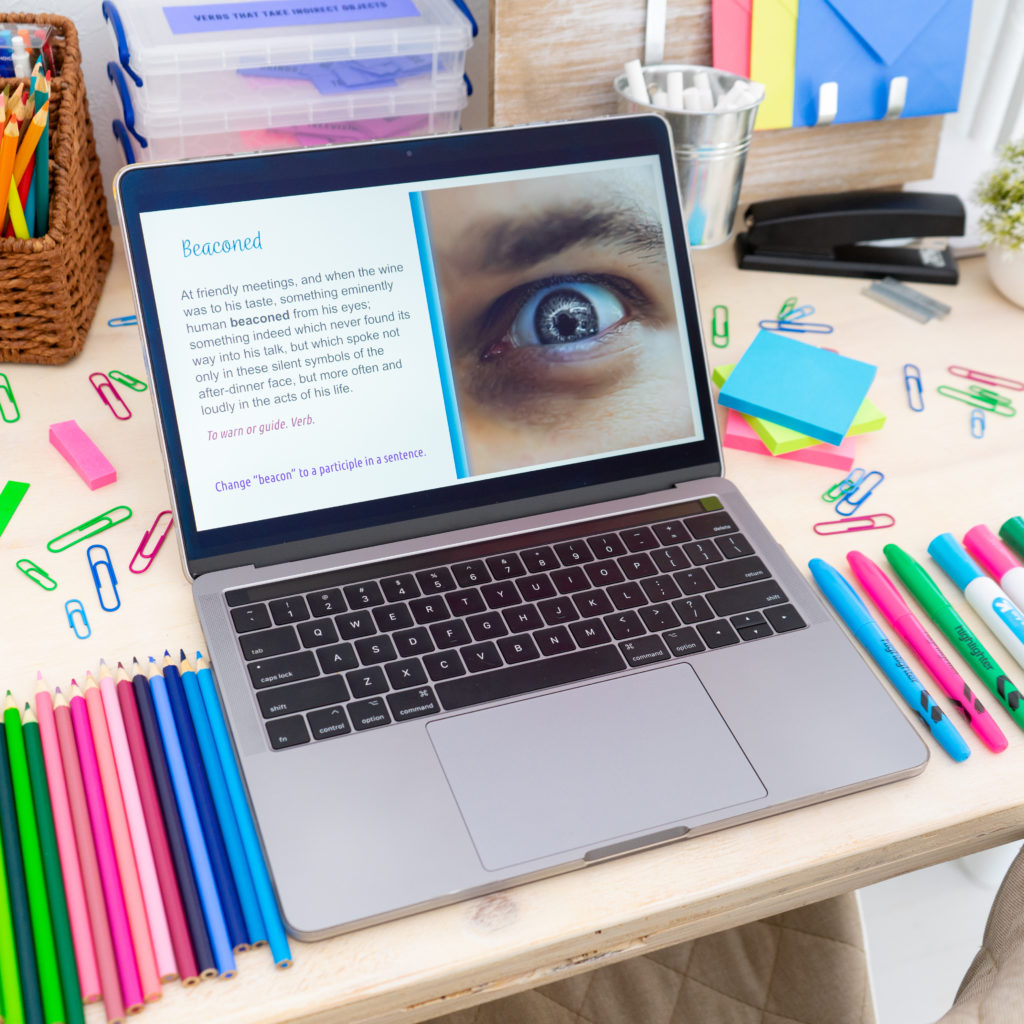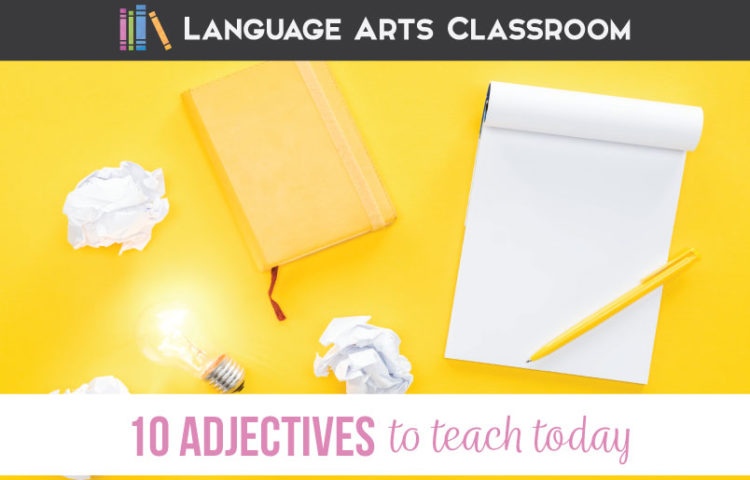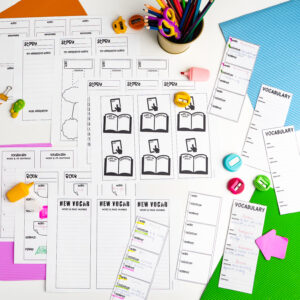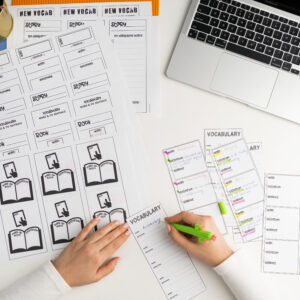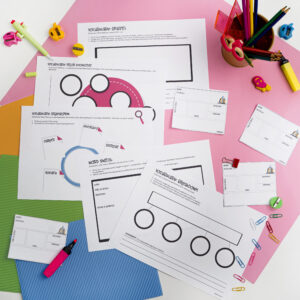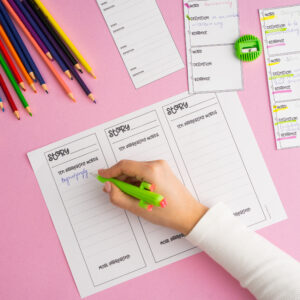Looking for a dynamite vocabulary and grammar lesson? Try these ten adjectives with the following vocabulary lesson ideas.
In this blog post, I (selfishly) sat down and thought of my ten favorite adjectives. My favorite word of all time might be “ominous,” and I often take opportunities to use it. I also enjoy “surly,” but that is honestly because I get to define it with the word “churlishly” as well. Overall, I had way too much fun creating this list, and I’m not joking when I say that I’d like to know your favorite word.
Not only am I chatting about my favorite words (you should share with me your favorite ones in the comments!), but I am also writing about ways to teach them. Below, I’ve outlined my thoughts and processes for combining English grammar with vocabulary lessons.
Are you referencing language standards?
Yes! And more!
Everyone has unique approaches for teaching vocabulary, but honestly? A vocabulary and grammar lesson makes works so well! When students and I learn new terms, we talk about grammar and make a grammar word wall to help students understand the words and how they function in sentences. We also use the vocabulary words again in related activities to review. Our conversations overlap, making for a comprehensive understanding of the vocabulary.
Second, vocabulary and grammar lead perfectly into writing skills. Classes can write (about most topics!) with whatever terms you are currently studying.
Third, with so many grammar rules and concepts to cover, I strategize for approaches that won’t bore students. Connecting vocabulary to grammar holistically is one such approach.
I hope these ideas help you to strategize as well.
Why create a vocabulary and grammar lesson?
Overall, I see most of an ELA class through a grammatical lens, but I especially understand vocabulary with grammatical concepts. Years ago, students and I wrote narratives using new terms. Then, as a group, we rewrote some of the new terms in other ways (like with irregular verbs). Naturally, a grammar discussion unfolded regarding different forms of words. Suddenly, covering grammar and vocabulary together, specifically in high school, made sense.
Next, learning vocabulary and grammar is crucial for effective communication and understanding. It enhances language skills, allows for clearer expression of thoughts and ideas, improves reading and writing abilities, and helps in developing a strong foundation for language learning and acquisition. A short discussion with students regarding the purpose of holistically looking at language benefits lessons, specifically in the context of the English language, is important for creating a well-rounded understanding of the language.
So eventually, I began purposefully meeting language standards together.
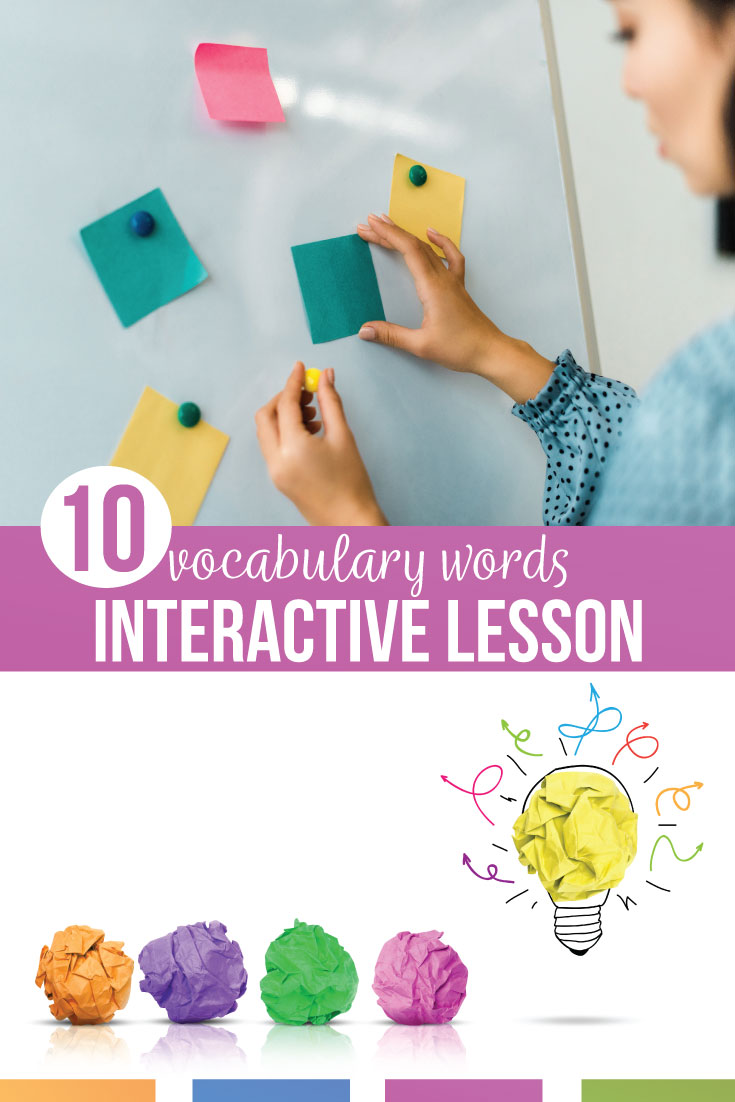
Finally, I struggled to think of only ten of my favorite adjectives, but eventually I did, and they are below. (You can also download those words in an editable document. You’ll find my form below.) By looking at my process, you can make this activity your own.
Lauralee’s favorite English adjectives:
- Ominous: portending evil or harm; foreboding.
- Speculative: pertaining to consideration of some subject.
- Effulgent: shining forth brilliantly; radiant.
- Dubious: doubtful, marked by or occasioning doubt.
- Provocative: inciting or stimulating.
- Pragmatic: of or relating to a practical point of view.
- Null: without value or effect.
- Unilateral: involving one side only.
- Tentative: not yet finalized.
- Surly: churlishly rude or bad-tempered.
All of those adjectives have noun and adverb forms. If you are working on higher standards (identify and correctly use patterns of word changes that indicate different meanings or parts of speech), you have a provocative* lesson already. Still, most teachers rightfully shy away from the simple “memorize and quiz” vocabulary lesson. We can make vocabulary words activities more!
How can you amp the vocabulary lessons while also meeting advanced language standards? Try these ideas:
Model dictionary use.
Vocabulary lesson ideas should include domain-specific vocabulary. With vocabulary, I use the dictionary to show students about verbs and modifiers. (If we have a grammar word wall, we then add the vocabulary words to the wall.)
Open the dictionary and look at the different forms of words. With ten words, you might even assign one word per student partnership. If you are teaching in a digital setting, record yourself walking through the discovery of a word in the dictionary. Students might not understand all that a dictionary offers, but with access to thousands of resources on Onestopenglish, including lesson plans, worksheets, audio, video, and flashcards, they can easily improve their vocabulary and grammar skills.
Discuss what you think when you hear a certain word. Act out the word if possible, or ask students about their prior knowledge of the definition.
Sometimes, a simple discussion of the word, its use in the dictionary, playing the dictionary’s pronunciation, and looking at sample sentences plants the knowledge of the word for students.
Write the words.
You can create many vocabulary words activities by playing with the words. Make the adjectives nouns. Then make the adjectives adverbs. Think of various activities, though.
Decide what type of writing you’d like students to practice (or ask them to choose), and ask for a paragraph or sentences with the vocabulary word used in another manner. Remind students to avoid the subject + linking verb + predicate word sentence.
Hang large sticky notes or posters around the room. Make a header of a goofy sentence. Rotate students around the room to add to the initial sentence to create a collaborative story that practices the vocabulary words.
Finally, create a jar of the vocabulary words with another jar of labels for nouns, adjectives, and adverbs. Students will draw a word and then the part of speech. That is their initial practice.
Any of those activities can be added to a grammar word wall. . .
Make a word wall.
I wrote about connecting grammar and vocabulary with a word wall a few years ago. A grammar word wall can be interactive, student-led, and connected to a vocabulary lesson.
If you have “dead” time in class, word walls fill that time constructively. Practice the meaning with students, and discuss the pictures students drew. Ask students to use the variations of words, and make a quick writing activity of it. (As an exit ticket, ask students to write a sentence on a sticky note and add it to the word wall.) For me, the more that students interact with the grammar word wall, the more they understand the words.
Plus? Older students enjoy seeing their work showcased. A word wall is wonderful for classroom community.
How can we close a vocabulary and grammar lesson?
A vocabulary and grammar lesson combination moves away from the dreaded “grammar out of context” conundrum. Grammar alongside vocabulary empowers students as they use the words in their writing. Finally, vocabulary words activities can be interactive, even for older students.
Vocabulary instruction paired with grammar instruction can bring rich discussions and deep understanding to classes.
Another tool that supports students with vocabulary lessons is pictures. Melissa details vocabulary lessons with pictures and more over at Reading and Writing Haven.
Do you have more ideas for a vocabulary and grammar lesson? Join my private Facebook group, Grammar Gurus. Teachers chat about ideas for a grammar word wall and much more!
